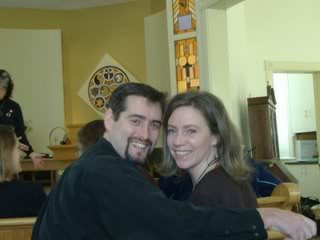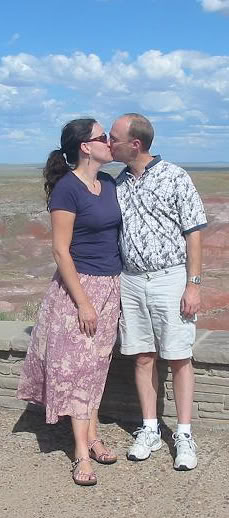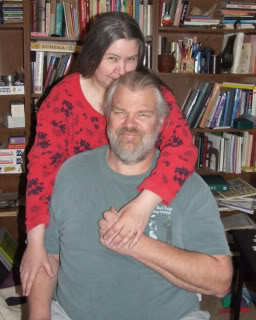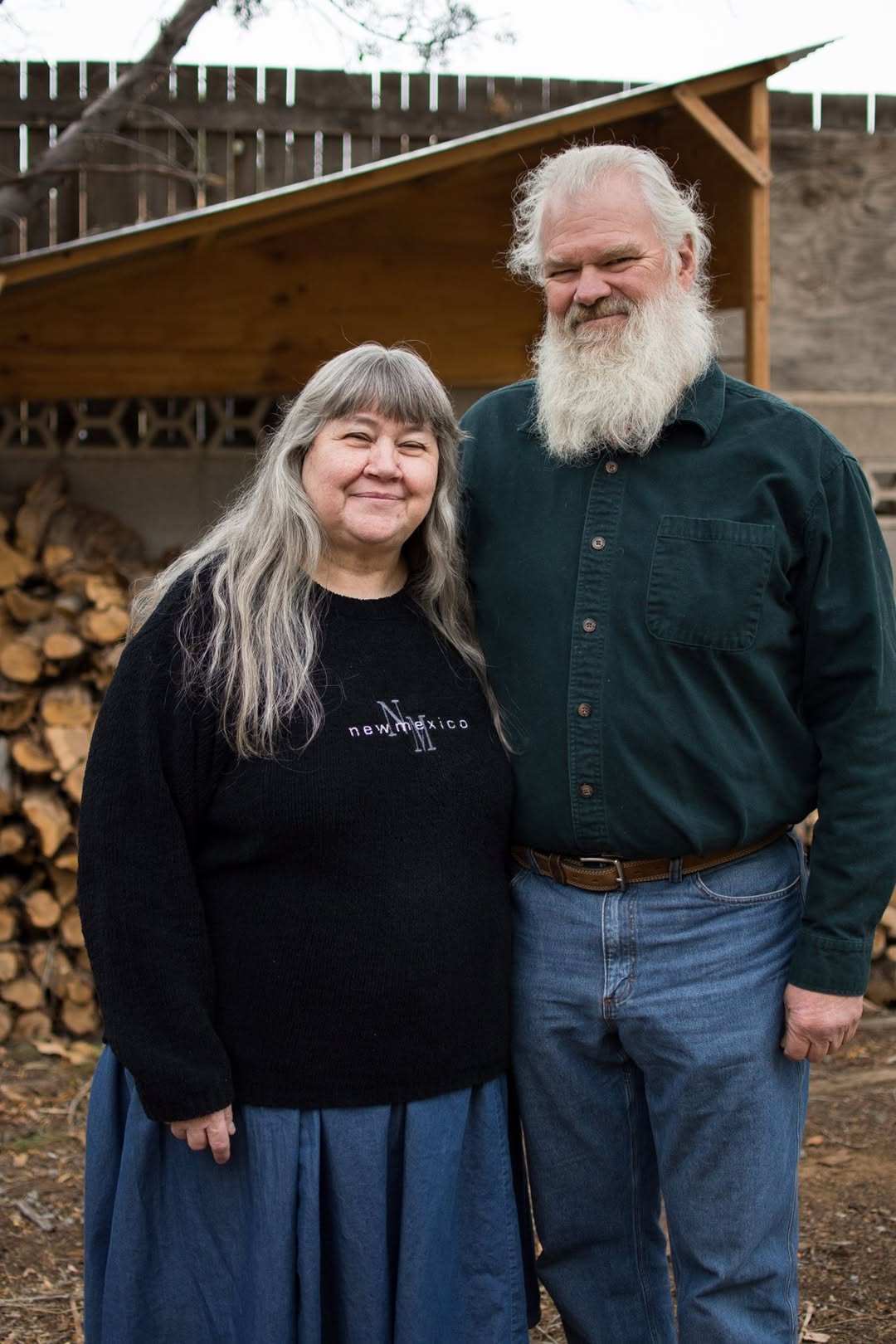
"I have to say that it's been unschooling and particularly your writings that have greatly improved my marriage." —Renee Cabatic
"It's been the best positive spiral of all—the more George and I take care of each other,
the more resources we both have for the kids."—Meredith
"I made my marriage very important to me. I chose to be very engaged in my marriage as a part of raising children."
"Sandra, Joyce, Pam and other wise posters here, my family thanks you for spending so much time helping us. My kids thank you especially and my husband. Thanks for helping me see the light in our marriage where darkness had been."—Robin in Cape Cod
"I never realized what marriage could be; our relationship has become so much deeper and more loving. Much of this is because of unschooling."
I don't know that I can't have everything, but I certainly don't want more than what I have. David and my anniversary was last week and we both forgot. I was in the shower this morning and realised that it had come and gone and there had been no one who missed it. 15 years and that day meant no more than any other day. Each day together is pretty amazing. I like that I don't need a to-do being made over the day David and I wed, and that he doesn't either. I like curling my cold toes around his warm feet in bed at night. I like the constance of our relationship. I like having someone to remember what I forget and to forget what I remember, even if the overlap isn't perfect. I don't know how that isn't everything. I don't know what it is that I could want that would be greater. And it is good for me to look at what I have in the moments when I'm buzzing about for something other.
Gail Higgins has shared photos and writing about a hike she and Broc took recently, and "how much fun I have every day sharing my life with this man. We know the importance unschooling has played in our connection and our trust and our playfulness and maybe these photos say it better than I could with ...words."

I have an amazing relationship with my husband because of the way we raise have chosen to raise our children. We grow WITH them as people. Through our brainstorming and working together as a family to figure out what all our needs are around our home, we have learned to communicate in a non violent way and very openly. We are able to discuss things openly without getting our feelings hurt (most of the time) and come to a compromise that suits both of us. Many times we realize it is simply one thing - usually a simple thing - that needs a gentle tweak. It makes me proud to think we have come so far in such a little time (we've been unschooling / homeschooling for 4 years now.) I love the closeness our family has developed as we learn to work together.
Sarah

When we grow up in homes where the unspoken promise was that it would be "our turn" when we were adults, then we grow up needy for "our turn". And, it turns out, that our parents lied. "Our turn" is full of responsibilities: bills and providing for everyone but ourselves. So we build up resentment. We resent when spouses take time for "their turn" to do the things they want. We resent when kids spend all day playing. (Not really seeing what their lives look like through their eyes and how powerless they really are.) We resent when we spend all our time doing for others: shopping and cleaning and cooking and schlepping them around. And the only way it seems that we can get "our turn" is to take from our kids— "No, I can't add another thing to my schedule, you've got it all filled up with your stuff! I'm doing something for me now! This is *my* time!" and rag on our husbands for not relieving the burden so we can have "our turn".
But it's a big old trap. The "you need to change so I can get what I need" pushes everyone away. It causes divorces.
What we're talking about is changing the way you view life, changing the choices you make. It's not about turning yourself off and doing nothing but giving. It's about seeing life differently so that you don't feel trapped by have tos, so you can find time for yourself without stealing it from your kids and your spouse, it's about being the helper in family problem solving rather than the fixer of it all. It's a way of "I need to change so I can get what I need." Once you do that, once you stop consciously and unconsciously pulling at everyone because your needs aren't met, then people stop moving away and you become someone they want to help.
It's a total mental shift and it isn't easy to grasp! But it is empowering.
Joyce
[UnschoolingDiscussion] Re: spouses
March 17, 2008 4:37:12 AM MDT
WOW, Joyce. Thank you for putting that SO concisely and accurately. I know so many women (myself included—more then, less now) who fall into the "I can't get what I need and it's your fault" trap. Blaming someone else makes you blind to the solution that lies within. I've been trying to avoid blame in general. All it really does is make the blamer feel angry and the blamee feel guilty and ashamed, or angry. It doesn't solve anything.
Susan G.

Jenny/Breezyj wrote:
As we settled into unschooling, I began to realize that I -wasn't- showing my husband the same respect I was showing my children. I had learned to support my children's needs, wants and interests, and understood how that was important to their well-being and our relationship, but I wasn't doing the same for my husband. His wants and needs—to play softball, to act, to farm— I saw as obstacles to my goals (time with him, time with the family), and so more often than not, I threw a bit of a hissy fit or got into a mood when he wanted to do one of "his" things. Needless to say, this was not good for our relationship!
Then I realized that if it's important to support my children's interests, it's equally important to support my husband in his interests—that those things are what HE needs to be a complete and whole person. And so gradually, I've been learning to support and encourage my husband's growth, and to accept him for who he is, rather than trying to continually get him to fit the mold of who I want him to be. Just this Spring, for the 1st time in almost 20 yrs, my hubby tried out for a play—and got a part! I won't say it's been easy— he's rehearsing 3-4 nights a week, on top of a demanding job—but it's worth it to see him happy with his life. And the dividends it's paid in the form of an improved relationship and happier marriage are DEFINITELY worth it.
Not only that, I'm more aware now of how encouraging my husband's interests enhances all of our lives. Because he plays ball, my children know that physical activity and fun continue throughout life. Because he plays ball, my kids have all understood the game of baseball well before they could play. And most of them have learned some math watching the scoreboard. Ball games also give them the chance to interact and play freely with other children, and even encourage business skills (my oldest collects aluminum cans). As for the acting...well, hubby and my 10 yr. old son are in the play together; how cool is that? And farming and gardening have led to a world of learning opportunities for my children.
Deciding to homeschool, and then to unschool, was one of the toughest decisions I ever made. But I have to say that it has unequivocably enhanced every area of our lives, including our marriage.
Jenny (breezyj)
(original)

It's pretty interesting all this talk about unschooling making marriages better. There's a clear sight that comes with unschooling principles which colors everything it comes into contact with, even with my angrier moments.
~Katherine

This morning I came downstairs and let in cats and let cats out and heated up coffee and turned on the computer and folded laundry out of my new dryer (I haven't had a dryer for seven years, first day I did like five loads of laundry, oh, so exciting!) and started making cat food. When I sat down with my coffee I realised I'd forgotten the sugar, so I went back to the kitchen and spooned sugar out of the bowl David got for me the other day from a local potter. And I thought about how rich I am.
He's at work this morning, but will probably be home about 1 and then we are going into town to pick up Linnaea's pre-ordered copy of Fable 3 with her fantastic Fable controller. Linnaea and I are getting pedicures given by fish while David and Simon go and look at shoes for Simon. Everywhere I look in my life I see generosity, I see loving and consideration. And it comes from each of us to each of us.
Some days, some moments I am overwhelmed by just how fantastic my life is and how supportive my husband is. David is absolutely wonderful.
We were talking the other day about what it was to be newly wed and how much meaner we were about our affections, how much we didn't trust each other to be there. I needed him to know how much work I did as a stay at home mom and he often didn't have the amazing patience and consideration he exhibits now much of the time. Our 14th anniversary was a couple of weeks ago. In the early years of our marriage I needed acknowledgement for most of those sorts of milestones. I wanted to have it writ large that I was special and that I was appreciated. This year we had company and Simon and Linnaea had particular meal desires, so, without any sense of personal deprivation on my part, and I think a joyous wonderment on David's (but I'm putting feelings into his person that he can't verify at the moment) we simply loved each other as we do most days. And we gave to Simon and Linnaea and we gave to each other and it was good.
I love that my sacred and my profane, my everyday and my for special occasions is one and the same. I hope all of y'all are having a good life. I hope the small things that infuse your day with joy come together and weave a tapestry of rich and royal hue.
Schuyler
Another one by the same author, I can quote without spoiling any drama or surprises. (You'll still be pleasantly surprised, I mean. 🙂
It's about showing respect and love. It's about honoring others and their needs. And that's just the tip of the unschooling iceberg.And so I think - I hope - my marriage is better for it. I admit I made the transition to honoring the children in their uniqueness years before it even occurred to me to do the same with my marriage. In the early days I worked a whole lot harder to get my way, until I realized one day that I didn't like a man without an opinion. Go figure.
So I re-evaluated. I remembered that the only way to be trusted is to trust, the only way to be loved is to be loving, the only way to earn respect is to show respect.
The whole thing: Wistful Wanderlust: Knowing When to Shut Up
I wanted to comment on something, and I’m sure others have noticed this and it’s probably been mentioned many times but anyway: All the side benefits from unschooling besides having healthy relationships with happy children. The one thing that I can single out that has most helped my marriage is unschooling. After I started treating my children nicer, more respectfully and gentler, it just sort of spilled over into my marriage. What a difference it can make. And then it just spills over into friendships and family at large. And now I notice my husband being more respectful and kinder. He wasn’t raised in a respectful home. His mother never treated any of her children with respect. But my husband is starting to get it. Not from me telling him or yakking in his ear about it but by just letting it spill over into his life.
Unschooling seems to develop a life of its own and grows. It started with me letting the seeds of respectful parenting grow inside of me and now it just seems to be taking over. Slowly. There are days that I think I lost it, but they don’t happen so often or we get back on track way quicker. And then sometimes it seems as though good things just happen all around us. It’s really amazing.
So we start unschooling for the sake of our children and it ends up making all parts of our lives better. I think it’s great marriage therapy!
Janet
The things I've learned from this list over the past few days about spouses and being a team rather than me and the kids against hubby are forcing more changes for the better. I am being nicer to the spouse as of yesterday although I haven't told him. I am looking at him differently already and really took to heart the parts of several posts that helped me realize (in 2 days of reading) that he will not ever be the person I want to mold him into. He is the perfect man I married with all his flaws and I am actively trying to change my actions towards him and be the wonderful, loving person he married rather than the nag I've become because he isn't meeting my needs. I am helping meet his needs more and I feel better about our marriage already. Two short days of reading...a crash course.
Sandra, Joyce, Pam and other wise posters here, my family thanks you for spending so much time helping us. My kids thank you especially and my husband. Thanks for helping me see the light in our marriage where darkness had been.
Robin in Cape Cod, MA
As I became more aware of my kids needs and responded to that it just naturally carried over to my husband. Our relationship is so much stronger now and part of it is just because I'm nicer now! 🙂 I think I used to be so controlling of our lives that it affected us all in a negative way. I'm still working on it but just the awareness of what I was doing has led to changes.
There are very few times when our lives don't seem in harmony these days...it's the best bonus I could have every imagined.
Gail Higgins

I didn’t expect [unschooling] to make things so sweet between me and Keith.
Partly Keith's just a nice guy, but principles that applied to the kids applied to the adults, too, and we all experienced and shared more patience and understanding.
The more I got to know Marty, the more ways I saw him like Keith, and because I was sympathetic to those traits in Marty which had bothered me in Keith, I became more sympathetic to and understanding of Keith.
That was cool.
Sandra Dodd
This has been true of my relationship with my husband as well. The deeper we applied the principles of unschooling to our lives with our son, the more we saw each other in a clearer, brighter light.
I thought the recent article "Masters of Love" by Emily Esfahani Smith was well worth reading and sharing:
Masters of Love
(If you have a subscription to The Atlantic, you can go to this link, but the one above will work for anyone.)In the article, Smith discusses research by social scientists studying marriage and what makes healthy, happy relationships. The article sparked a light-hearted conversation between Graham and myself, while we made breakfast together, about how the two of us communicate with each other in our own marriage - what we do well and what we can do better. We shared a good laugh about some of our communication blunders in the past :-) It was a lovely moment of supporting and encouraging each other to do better. I thought it was wonderful that we could talk about some challenging moments from our past without any hard feelings, but with kindness and gentleness.
Here is an excerpt from the article that I thought would be especially helpful to partners (and parents!):
Throughout the day, partners would make requests for connection, what Gottman calls “bids.” For example, say that the husband is a bird enthusiast and notices a goldfinch fly across the yard. He might say to his wife, “Look at that beautiful bird outside!” He’s not just commenting on the bird here: he’s requesting a response from his wife—a sign of interest or support—hoping they’ll connect, however momentarily, over the bird.And another excerpt:The wife now has a choice. She can respond by either “turning toward” or “turning away” from her husband, as Gottman puts it. Though the bird-bid might seem minor and silly, it can actually reveal a lot about the health of the relationship. The husband thought the bird was important enough to bring it up in conversation and the question is whether his wife recognizes and respects that.
People who turned toward their partners in the study responded by engaging the bidder, showing interest and support in the bid. Those who didn't—those who turned away—would not respond or respond minimally and continue doing whatever they were doing, like watching TV or reading the paper. Sometimes they would respond with overt hostility, saying something like, "Stop interrupting me, I’m reading."
These bidding interactions had profound effects on marital well-being. Couples who had divorced after a six-year follow up had "turn-toward bids" 33 percent of the time. Only three in ten of their bids for emotional connection were met with intimacy. The couples who were still together after six years had "turn-toward bids" 87 percent of the time. Nine times out of ten, they were meeting their partner’s emotional needs.
Much of it comes down to the spirit couples bring to the relationship. Do they bring kindness and generosity; or contempt, criticism, and hostility?
"There’s a habit of mind that the masters have," Gottman explained in an interview, “which is this: they are scanning social environment for things they can appreciate and say thank you for. They are building this culture of respect and appreciation very purposefully. Disasters are scanning the social environment for partners' mistakes."—Rippy Dusseldorp"It’s not just scanning environment," chimed in Julie Gottman. "It’s scanning the partner for what the partner is doing right or scanning him for what he’s doing wrong and criticizing versus respecting him and expressing appreciation."

Hair color may change, but those smiles are still the same!I responded:
We're not always smiling. Some disclosure: Sometimes we start to recite one of our repeat arguments, but we remember it's a re-run, and jump to the end, or trail off. They're about feeding cats (how to), or putting tools up (one of us is too short sometimes, and figures "on the bench" is close enough), how to do laundry (mostly we do our own now, and it pisses me off that his isn't totally ruined for his not following my instructions).
I guess the trick is to know it's about cats, tools, and laundry, and not about the soul of the other person.—Sandra Dodd, 2018